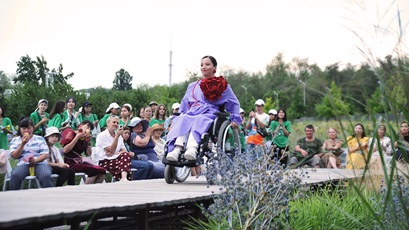people and community
from service to sector: veterans power up their future in energy
4 min read | november 08, 2024
Chevron employs veterans from all over the world.
With a lineage steeped in military tradition, Vicki Tinley found the decision to join the Royal Australian Navy straightforward. Growing up, she was always immersed in tales of service and duty.
And when it was time to transition to the civilian workforce, the oil and gas sector was another natural fit. The skills she had acquired as a naval supply officer were well matched with her position on Chevron’s supply management team.
“The way you support a military unit—a ship in my case—is similar to how you service an operating plant,” said Tinley, Chevron Australia’s supply chain management business manager. “The only difference is that in the navy, the operating plant moves.”
vicki tinley
supply officer
royal australian navy, 12 years
answering the call
While Tinley followed in her family’s footsteps, others felt a call to serve for other reasons.
Witnessing the events of 9/11 inspired Lacey Paquin to pursue a career in the U.S. Coast Guard.
“Watching the towers fall, I felt a profound calling to serve my country and contribute to its safety and security,” recalled Paquin, who served as an information technician.
“Working for something that is bigger than just yourself has always felt good. Everybody should have a place in public life in some way or other.”
bertie hamilton
reservist
british army, 10 years
Paquin was honorably discharged in 2007. Then she pursued a college education before landing at Chevron in Pascagoula, Mississippi. She now works as a lead emergency management specialist.
Paquin finds many similarities between her life at Chevron and her life in uniform.
“Both roles involve developing comprehensive plans, conducting drills and responding to emergencies,” she said. “It’s a reactive type of service that requires quick thinking and effective coordination. I find that the sense of urgency and the need for meticulous planning keep me on my toes and constantly engaged.”
lacey paquin
information technician, second class
U.S. Coast Guard, 4.5 years
civilian life
Tinley and Paquin are among hundreds of veterans who have brought their military skills to positions with Chevron.
The skills veterans learned while enlisted—including grace under pressure, adaptability and critical thinking—could benefit any industry, including the oil and gas sector.
paul everett
paratrooper
australian army, 5 years
That’s according to Ian Pollard. He’s a Chevron instrumented protective systems engineer who previously served as a sergeant in the U.S. Marines. During his service, he acquired several skills that have proven invaluable in his civilian work life.
“One of the most important lessons I learned was the importance of taking initiative. There’s always something that needs to be done, and going the extra mile never goes unnoticed,” Pollard said. “I also learned to discern which battles are worth fighting. Not every challenge requires confrontation, and knowing when to stay quiet is a crucial skill. This wisdom has helped me navigate complex situations with grace and effectiveness.”
ian pollard
microwave equipment radio operator
U.S. Marines, 4 years
more on that
Lonnie Evans, a Chevron emergency preparedness and response officer, is the outgoing president of Chevron’s Veterans Employee Network. As a former reserve command master chief for the U.S. Coast Guard, Evans has experienced the seamless transition of military skills into careers in the energy sector.
lonnie evans
emergency preparedness and response advisor outgoing president
chevron’s veterans employee network
giving back
Chevron’s veterans have served in many countries, including Greece. That’s where Alexander Papandreou was conscripted into the military at age 18. He served in the Hellenic (Greek) Air Force for two years, participating in special tactical operations in both Greece and the southeastern part of the NATO command territory.
Papandreou now lives in the U.S. and works as managing counsel for Chevron’s Procurement, Construction and Digital Contracting Law Group.
In his spare time, he gives back by offering fellow veterans free legal advice.
“One of the most gratifying things I do in my life is helping veteran causes,” Papandreou said.
alexander papandreou
special tactical operations and reservist
hellenic air force, 27 years
topics covered
related content
-

 reducing methane emissions is personal for colorado man
reducing methane emissions is personal for colorado manpeople and communitydecember 16, 2024
-

 restoring Colombia’s coral reefs
restoring Colombia’s coral reefspeople and communitynovember 20, 2024
-

 fashion event shows that inclusivity is always in style
fashion event shows that inclusivity is always in stylepeople and communitynovember 18, 2024
-

 in race car competition, hydrogen is an element of success
in race car competition, hydrogen is an element of successpeople and communitynovember 05, 2024
chevron email updates
Subscribe to our newsletter to receive news and updates.



